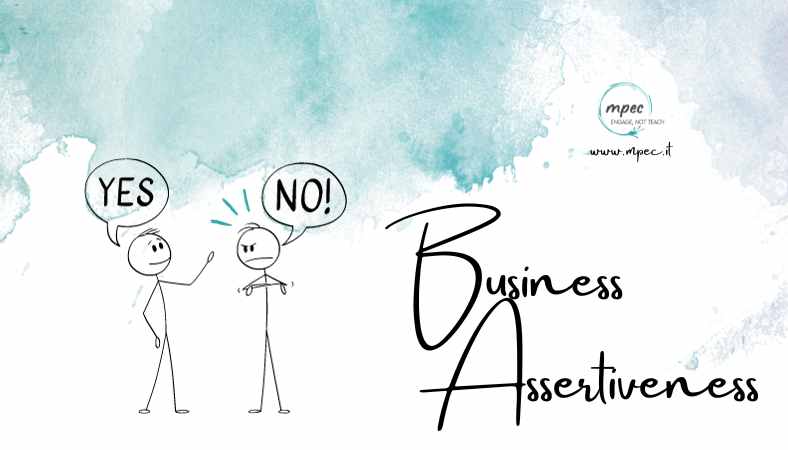Welcome to our Business Communication Club session on “Business Communication in English: Building Business Assertiveness – Focusing on Idioms and Practical Exercises.” In the business world, assertiveness is a key communication skill that balances professionalism with directness. This session will help you articulate your thoughts confidently and respectfully in English, using idiomatic expressions to enhance your communication. Through practical exercises, we’ll focus on developing an assertive tone that’s both effective and culturally sensitive in various business scenarios.
Non sai da dove iniziare?
Not sure where to start?
Understanding Assertiveness in Business Communication
- “What does being assertive in a business context mean to you, and how does it differ from being aggressive?”
- “Can you give an example of a situation where assertiveness in communication led to a positive outcome in your workplace?”
Key Grammar/Vocabulary:
- Assertive vs. Aggressive (e.g., “Assertive communication is firm yet respectful, unlike aggressive communication, which…”)
- Positive language (e.g., “Using positive language, I express my views by saying…”)
- Diplomatic language (e.g., “Diplomatic language, like ‘I understand your point, but…’, is effective for…”)


Using Idioms to Express Assertiveness
- “What are some common English idioms that convey assertiveness without coming across as too aggressive?”
- “How might you use idioms to firmly state your opinion or decision in a business meeting?”
Here is the link to an in depth analysis of assertiveness.
Building Assertiveness – Handbook
Sample Idioms You Could Discuss and Use Today:
- Hold one’s ground 🦶
- Meaning: To maintain one’s position or opinion despite opposition.
- Example: “Even when the client was pushing back, I held my ground on our project terms.”
- Lay it on the line 📏
- Meaning: To speak frankly and directly, often about risks or negative outcomes.
- Example: “During the negotiation, I had to lay it on the line about our capacity limits.”
- No-nonsense approach 🚫🎭
- Meaning: A very practical and direct way of doing things without unnecessary extras.
- Example: “Our manager’s no-nonsense approach ensures clarity in team assignments.”
- Call the shots 📞🎯
- Meaning: To make the important decisions; to be in charge.
- Example: “As the project leader, it’s your role to call the shots and guide the team.”
Practical Scenarios for Assertive Communication
- “Think of a time you needed to be assertive at work. How did you handle it, and what phrases did you use?”
- “How would you assertively negotiate a deal or a project deadline with a client or colleague while maintaining a positive relationship?”
Key Grammar/Vocabulary:
- Negotiation phrases (e.g., “In negotiations, phrases like ‘I see your point, however…’ are useful.”)
- Firm but polite language (e.g., “Phrases like ‘I must insist’ or ‘I would strongly suggest’ convey…”)
- Direct questions (e.g., “Asking direct questions, such as ‘What is your deadline for this project?’ helps in…”)

Remember – there is always more! Here is your Follow Up Video:
#BusinessAssertiveness #EnglishCommunication #BusinessIdioms #ProfessionalEnglish #AssertiveCommunication #BusinessEnglishPractice #CommunicationSkills #WorkplaceAssertiveness #EnglishForBusiness #PracticalEnglishExercises #EffectiveCommunication #IdiomaticExpressions #BusinessScenarioPractice #EnglishAssertiveness #CorporateCommunication #ProfessionalDevelopment #AssertivenessTraining #EnglishLanguageLearning #BusinessCommunicationSkills #EnglishInBusiness
Business Assertiveness in English, Effective Business Communication, English Idioms in Business, Assertive Communication Skills, Practical Business Exercises, English Language Proficiency, Professional English Usage, Workplace Communication Skills, Business Scenario Training, Assertiveness Training Exercises, English for Professional Development, Corporate Communication Strategies, English Language Exercises, Business English Vocabulary, Effective English Phrases, Assertive Speaking in Business, Business English Idioms, English Communication Techniques, Professional English Training, Business Language Skills







